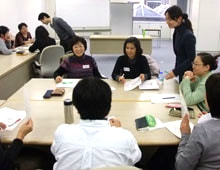SHARE
Services for the Health in Asian & African Regions (SHARE) = SHARE is a citizen sector organization (NGO) that engages in international cooperation mainly through providing health service.
HOME > Activity > Japan > Health Project in Japan > Interpreter Training and Dispatch Service for Non-Japanese TB Patients
- What We Do TOP
- Cambodia
- Project Now
- Project Past
- Timor Leste
- Project now
- Training for Health Care Education
- Monitoring and Follow-up of Participants in the Training
- Project Past
- Japan
- Health Projects in Japan
- Free Consultation
- Telephone Consultation on Medical Care
- Interpreter Training and Dispatch Service for Non-Japanese TB Patients
- Support for HIV-positive Migrants in Japan
- Campaigning for Raising Awareness About AIDS for Thai People
- Building Awareness
- Activities in Japan
- Domestic Efforts
- Understanding of HIV/AIDS
- Emergency Relief
Interpreter Training and Dispatch Service for Non-Japanese TB Patients

Support to Secure Adequate Treatment
Among non-Japanese TB patients living in Japan, many develop the disease several years after their arrival in this country. Quite a few people find it difficult to receive adequate medical care because of language barriers, etc.In cooperation with the Tokyo Metropolitan Government and Japan Anti-Tuberculosis Association, SHARE offers "Dispatch Service of Supporter(s) to Assist Non-Japanese TB Patients Regarding Medical Care and Drug Therapy." This program aims to assist public health nurses from Health Centers in Tokyo when they visit hospitals or the homes of non-Japanese TB patients, and gives interviews at Health Centers for continuing treatments. Interpreters are expected to help convey accurate information to such patients and complete their treatments. SHARE's role is to offer high quality interpreting services by securing interpreters and arranging their dispatches. SHARE offers a 6-hour training and evaluation of interpreting skills and provides twice a year follow-up training to interpreters registered. SHARE also offers counseling to public health nurses regarding support for non-Japanese TB patients at any time.
The Bureau of Social Welfare and Public Health, Tokyo Metropolitan Government is responsible for implementing this project, and SHARE offers its assistance based on knowhow related to medical care for foreign nationals and countermeasures for infectious diseases contract so far by them.
 [Languages available] Chinese, Filippino, Thai, Korean, Portuguese, Spanish, English, Myanmarnese (Burmese), Nepali, Indonesian, French, Vietnamese, and Hindi. 34 interpreters for 13 languages are registered with the Tokyo Metropolitan Government (as of the end of June, 2010).
[Languages available] Chinese, Filippino, Thai, Korean, Portuguese, Spanish, English, Myanmarnese (Burmese), Nepali, Indonesian, French, Vietnamese, and Hindi. 34 interpreters for 13 languages are registered with the Tokyo Metropolitan Government (as of the end of June, 2010).
[Results] In 2009, a total of 99 dispatches were made to hospitals, health centers, patients' homes and work places. Interpretation services were used to explain the patients' conditions, treatments and drug administration, ascertaining those with whom patients had contact, explaining health examinations to those contacts, and counseling after discharge.
Photo: Group work at the follow-up training


